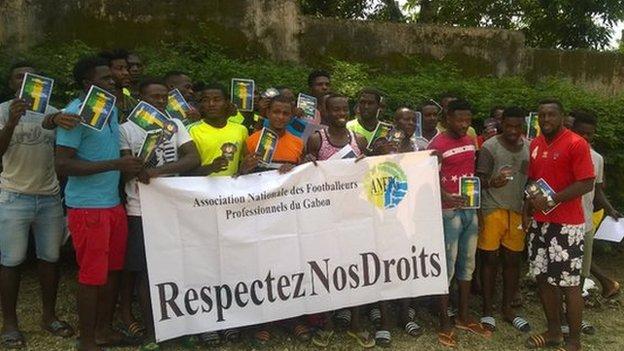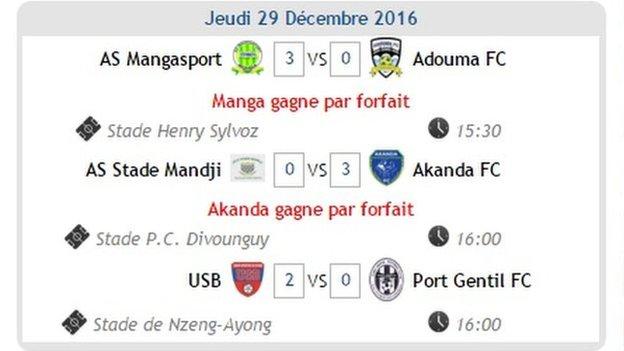Football in Gabon labelled 'anarchic' by footballers union
Last updated on .From the section Football

Just days before Gabon hosts the 2017 Africa Cup of Nations, the state of league football in the country has been described as "anarchic".
In December, four local teams boycotted games in protest over unpaid wages.
"The situation is a result of bad management, and a lack of control and accountability in the management of clubs and football institutions," said Gabon's footballers' union (ANFPG).
The ANFPG hopes the Nations Cup can improve local players' conditions.
The union says many first and second division players are still owed substantial salaries from last year.
In December, world governing body Fifa intervened to ensure that Mangasport - league champions in 2014 and 2015 - paid a former player, Ivorian Mariano Beugre, his outstanding wages.
"We can confirm that the Dispute Resolution Chamber judge dealt with a dispute opposing the player Mariano Beugre to the club Mangasport," a Fifa spokesperson told BBC Sport.
"According to the relevant decision, the club is ordered to pay to the player the amount of ($28,000)."
Gabon will stage the Nations Cup, which runs from 14 January until 5 February, for the second time in five years, having co-hosted with Equatorial Guinea in 2012.
"We believe this Nations Cup must allow us to have a collective awareness and take stock of our football since the last Nations Cup in 2012," Remy Ebanega, president of the ANFPG, told BBC Sport.
"[We need] to put in place general rules for the best practice.
"Our football is deteriorating every day of every year simply because its leaders have not yet understood that the main player is the footballer. Without a footballer, there is no club, no league, even less a federation.
"Everything is done in an anarchic way, with the sole interest of a handful of people, and no reflection on the short, medium and long term objectives of our football."
In a survey published by global players' union FIFPro in November, 96% of players in Gabon reported payment delays.
On 29 December, players from Stade Mandji - title-winners in 2009 - and Adouma FC refused to play matches in protest (with their opponents awarded technical 3-0 victories as a result).

Two teams in the second division also went on strike.
One of the Stade Mandji players, defender Franck Perrin Obambou, has been included in Gabon squad for the Nations Cup, which the hosts open on Saturday against Guinea-Bissau in Libreville.
Only two other domestic players have made the squad, with both Yves Bitseki Moto and Cedric Ondo Biyoghe on the books of league leaders Mounana.
Some of the continent's finest footballers are set to play on Gabon's pitches this month, including recently-crowned Confederation of African Football's African Footballer of the Year Riyad Mahrez of Algeria and Senegal's Sadio Mane, Africa's most expensive footballer.
All eyes will also be on Gabon's Pierre-Emerick Aubameyang, the free-scoring striker with Germany's Borussia Dortmund and an ANFPG vice-president as well.
But Africa's flagship sporting event has been beset by problems, with opposition members of parliament calling for the public to boycott matches in protest at the country's political and economic problems.
Some fans have responded by posting images of ripped-up matchday tickets on social media.
While Gabon hosts some of the richest African footballers for the month-long tournament, local players will continue their fight to be paid.
The league, which is suspended for the duration of the Nations Cup, is set to return on 18 February.
No club from Gabon has ever won a major continental football title, while the national team has never surpassed the quarter-final stage of a Nations Cup.
The BBC contacted organisers of the Gabonese league who have yet to comment.







